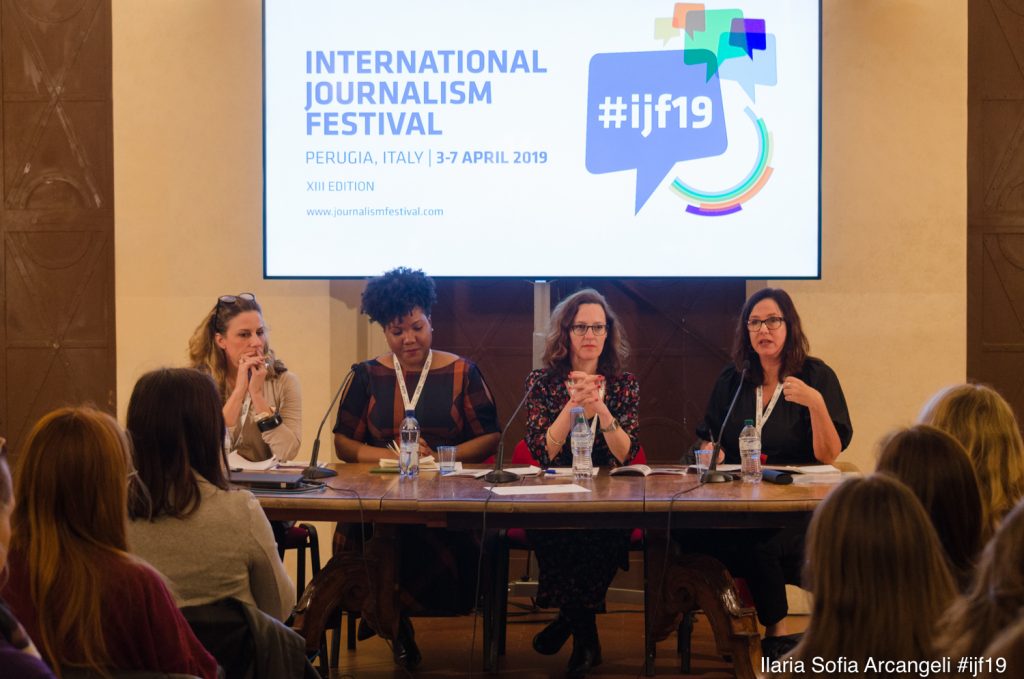Stay up to date by subscribing to our Newsletter or by following our Telegram channel, and join the conversation on Facebook, Twitter, and Instagram.
Edited by Marco Nurra
A record number of #ijf20 proposals: for the love of journalism. Here are the numbers: a total of about 550 English-language proposals were received, of which 97 on 31 December (deadline day) alone, from Uruguay to Canada, from South Africa to Finland, from Australia to Nigeria and points in-between. This is, by a significant margin, the highest number of proposals we have ever received. A heartfelt thanks to you all.
BBC facing huge bill for equal pay cases after Samira Ahmed verdict. Samira Ahmed has won her equal pay claim against the BBC in a landmark case that lawyers say could leave the broadcaster facing a bill running into the millions for similar claims by other female staff. An employment tribunal unanimously concluded that the BBC had failed to provide convincing evidence that the pay gap was for reasons other than gender discrimination, although the BBC continues to dispute this.
Anti-immigration author Peter Brimelow is suing the New York Times over an article that called him an “open white nationalist”. The characterization of Brimelow that triggered the libel lawsuit appeared in a Jan. 15, 2019 article. Brimelow rejects that label, preferring to be called a “civic nationalist.” Brimelow’s 1995 book about the dangers of unchecked immigration, “Alien Nation,” served as rallying cry for those who support a crackdown on immigration and prompted reviews in such outlets as the Times. His writings also appear to have had some influence among White House officials devising President Donald Trump’s immigration policies. “We stand by the story and will vigorously defend,” Times spokeswoman Eileen Murphy said.
News Corp employee lashes climate ‘misinformation’ in bushfire coverage with blistering email. News Corp papers have been accused of placing undue emphasis on issues such as arson and hazard reduction in a way that diverts attention from climate change’s role in creating longer, more severe fire seasons.
The climate crisis gets the coverage it deserves. “The climate crisis is an existential threat for the world as we’ve known it. Given that, will the story get all the resources it deserves from already-strapped news organizations? Probably not. But there were multiple examples of serious journalistic commitments in 2019 which point the way forward.”
“Rated false”: Here’s the most interesting new research on fake news and fact-checking. Journalist’s Resource collects the best of 2019, including research into the effectiveness of fact-checking, why people are susceptible to fake news, and the changing volume of misinformation on social media.
A time to question core beliefs. “Are the things we have always assumed to be true, true? Do the things we have always assumed to work, work? Have they ever, and for whom?”
A guide to navigating the Trump-Iran story. A list of points to keep in mind, and useful things to read, as we try and navigate the story.
Media leaders agonize over amplifying Trump lies as 2020 election year begins. The Guardian and the Columbia Journalism Review talked to 30 top editors, reporters, TV executives and commentators across the US. With the first poll of the Democratic nomination contest in Iowa just four weeks away, the issue of Trump’s domination of the 24-hour news cycle continues to disturb many media figures.
All journalism should be service journalism. “Reporters need to think more like teachers, developing new structures and forms that reinforce new information, that place it in the context of what has come before and what may come next.”
A guide to investigating anti-LGBTQI+ hate. Taboom Media has created a reporting guide for journalists interested in investigating how US-based faith groups and NGOs foment hate against LGBTQI+ communities, both in the United States and abroad.
The YouTube ‘radicalization engine’ debate continues. Does the network and the software that powers its video suggestions actually turn users into consumers of far-right conspiracy theories and other radical content, and if so what should be done about it?
Facebook bans deepfakes, but lots of other manipulated videos are still allowed. “Deepfakes are no more scary than their predecessors, ‘shallowfakes,’ which use far more accessible editing tools to slow down, speed up, omit or otherwise manipulate context. The real danger of fakes — deep or shallow — is that their very existence creates a world in which almost everything can be dismissed as false,” First Draft’s Claire Wardle wrote in The New York Times last year.
Experts on mis- and disinformation around the world unveil what to expect and how to be more resilient in 2020 in First Draft’s Information Disorder: Year in Review series.
The International Journalism Festival #ijf19 On-Demand
Every week, one recommendation from the extensive programme of the last edition of the International Journalism Festival.

Today we are inviting you to watch “Women in journalism: beyond the #metoo moment“. The #metoo moment forces us to ask: how do we shape newsrooms to empower women in journalism to shatter the glass ceiling. As the number of women in journalism climbs around the world we have to move beyond calling out bad behaviour such as sexual harassment and trolling. We have to work out how to shape work to end inequality in pay, opportunity and promotion, from top to bottom. Women are joining together to demand equality and respect and to empower women at work, and journalism can lead the way.

